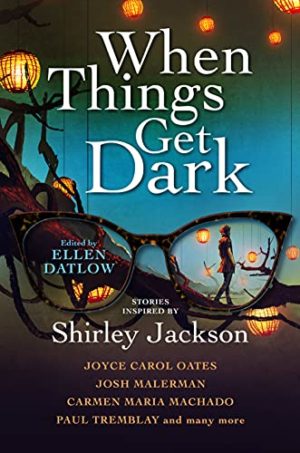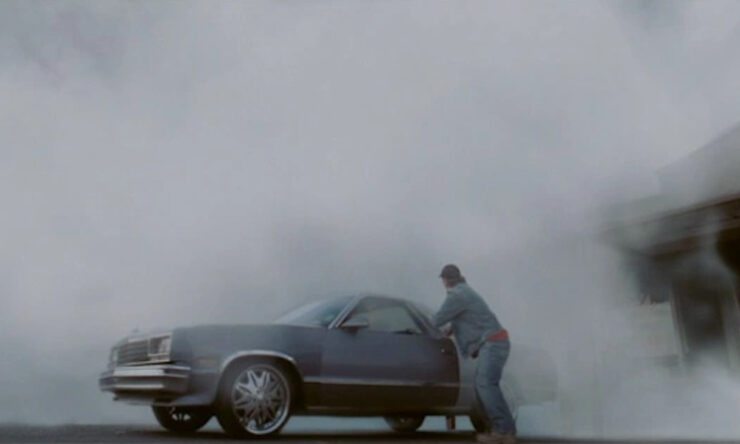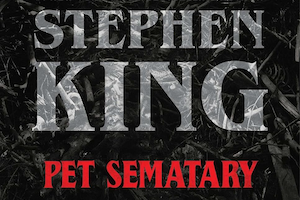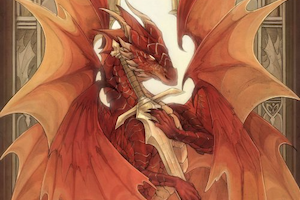Welcome back to Reading the Weird, in which we get girl cooties all over weird fiction, cosmic horror, and Lovecraftiana—from its historical roots through its most recent branches.
This week, we cover Seanan McGuire’s “In the Deep Woods; The Light is Different There,” first published in Ellen Datlow’s 2021 When Things Get Dark anthology. Spoilers ahead, but as with our first selection from this book, this one is well worth reading for yourself.
“So many ghosts, and some of them have names and some of them have faces and some of them only have whispers from her father on dark winter nights, stories with nothing to support them.”
Children will tell you that sunlight’s the same everywhere. Children realize that adults often prefer lies, as they also know dangers adults have forgotten and truths they have forsaken. Sunlight’s not the same everywhere. Once light leaves its source, travel and time transform it into something “sweet and profound as a secret, sometimes kind and sometimes cruel, but always remaining sunlight.” In deepest woods, it falls like honey; “it is not sweet, but it is slow, ponderous, and intentional.” It isn’t warm or welcoming, for its “master is not the quick, swift humanity of city and shore.”
Where deep woods abut on tamed places, the strange ones grow, humans who “breathe in both the sweet treacle sunlight of the modern world and the deep, rich, cruel sunlight of the ancient one…children of a stranger sun [whose] desires matter no less than the desires of their citified cousins.”
“If the woods can transform sunlight, what must they do to moonlight?” What transformations could it effect in time? The strange ones “walk in shadows made of light, and they are perfect and they are profane, and they would not forgive us if they could.”
***
Following divorce from her abusive husband Marcus, Millie Ellis arrives at her father’s long-unoccupied lake house. Ironically, it was her parents’ divorce that drove him from New York into the deep woods; he’d have gone mad staying in a city permeated by his ex-wife. Custody arrangements required Millie’s parents to get permission to take her out of state; when her mother spitefully forbade Millie the lake, her father forbade vacations abroad. Now with both parents dead and husband gone, Millie can finally claim the lakeside property.
If she really wants to, after opening the door on dust and sheet-shrouded furniture. The caretakers have obviously done nothing to prepare the house. So much for the upkeep money her grandparents arranged before their disappearance. Still, the place is isolated, without even a working phone line yet; Marcus won’t easily track her here.
Ghosts surround Millie as she steps inside, and floating lights like she used to see as a child, when “a form-fitting fairyland” was her only refuge. The ghosts are the shrouded furniture, the fairies dust motes. Will she be as lonely here as in the more dangerous city? Her mother warned her that Marcus might turn cruel. And so he did, when his beautiful, wealthy party prop didn’t also provide a son.
Dust-choked, Millie retreats to the porch and finds a visitor: a “broad, friendly-faced teen of no obvious gender” dressed in overalls and plaid shirt, with two horn-like cowlicks in their hair. Turns out the teen is the caretaker’s daughter, who likes to fish off Millie’s dock. Millie invites the teen to fish on, in exchange for teaching Millie the art. The teen’s pleased, remarking that “most city folk aren’t so accommodating” and predicting Millie will “learn the way of things” before she returns to the city. Before Millie can say she’s not just there for the summer, the teen lopes off like a hunting hound.
Millie cleans up a bedroom overlooking the lake. The electricity is off, but moonlight renders the water as “bright and clean as hammered silver,” and Millie drops asleep.
The sound of booted footsteps wakes her. She hides in a wardrobe full of her grandmother’s clothes. The footsteps enter her room. Outside a dog or coyote howls. The intruder closes the window on the sound. The footsteps are too familiar. Of course she knows who has followed her to the woods, and she longs for a weapon.
The next sounds are clacking claws, the man’s shocked yell, then screams accompanying “the wet, visceral sound of tearing meat and breaking bone.” Apart from its ravening, the “fell beast” remains silent. Millie weeps among antique garments, sure the beast will find her.
Buy the Book
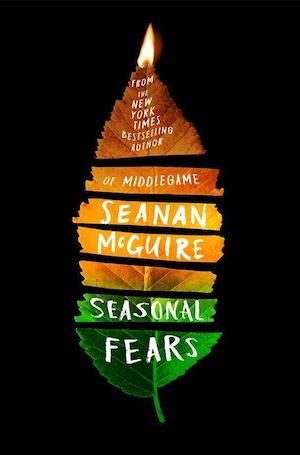

Seasonal Fears
Instead she passes the night unmolested and peeks out at a room unchanged, except for the closed window and a man’s shoe under the bed. She retrieves it as “a memoir” of the man she loved before he “proved himself a monster.” Still cradling the shoe, she goes outside to dispose of it.
The caretakers arrive. The father apologizes for mistaking her arrival date and asks if she slept well. Millie lies, then admits something spooked her in the night. Telling the truth “feels like lancing a wound.” The caretakers exchange “complicated” looks. Then the father invites her to walk with him and daughter Eunice while wife Julie cleans house. As Eunice says, they know the best places for throwing things away.
Millie breathes the “thick, honeyed sunlight,” feeling more safe and at peace than ever before. “I think I may stay here forever,” she says, and the locals smile. All this has happened before, will happen again, is precisely what it’s meant to be.
Millie is finally home, and “the light is different here.”
What’s Cyclopean: The sun may be the same everywhere, but the light itself is “unforgiving” in the desert, “diffuse and muddled” by the coast, and “slow, ponderous, and intentional” in the deep woods.
The Degenerate Dutch: Mutual fear between city and country folk has a long history in weird fiction, made more complicated here by Millie’s divorced parents using that divide as a tool of mutual aggression.
Weirdbuilding: Beware of normal-seeming vacation towns. Or become one of the things people need to be wary of.
Libronomicon: Inside of a house with no electricity, it’s too dark to read.
Madness Takes Its Toll: Millie has trouble tracking whether she actually got in touch with the lake house’s caretakers, and whether the house is haunted. To be fair, so do we.
Anne’s Commentary
A preliminary realization: Most of the Seanan McGuire/Mira Grant pieces we’ve discussed in this series include the same resonant word. First there was “Down, Deep Down, Below the Waves.” Then Rolling in the Deep. Now her contribution to the Shirley Jackson tribute anthology, When Things Get Dark: “In the Deep Woods; The Light is Different There.” Coincidence? Consider that the title of one of Ruthanna’s novels is Deep Roots. Consider the original title of my novel Fathomless was Deeper. Screw coincidence. I suspect alien intelligences are prompting our choices; when we accumulate a certain mystical number of titular “deeps,” the Outer Gods will return to raven and revel, et cetera. But, onward!
Light is not the same everywhere, the kids are right. Once it leaves the vacuum of space, it’s subject to the local vagaries of atmosphere and weather, natural topography and human ingenuity. It’s also subject to interpretation. Your insufferable glare might be my invigorating brilliance. I’d be right, of course, but that’s not the point.
Or is it? For (way-oversimplified) argument’s sake, let’s say rural dwellers shrink from sunlight reflection-amplified by glass, metal and concrete, while urban dwellers bask in it. Which is better, city or country? The answer would depend on which tribe you belong to. That’s tribes in a general sense, groups at once inclusive and exclusive into which people get sorted or sort themselves; a tribe could be anything from a nation to a family by blood or inclination. You don’t have to hold with tribalism. You can hold instead with multiculturalism and social flexibility, tolerance and mutual respect.
But tribalism is a powerful notion on which to base weird fiction, especially of the horrific variety. Shirley Jackson knew this to her core. Tribes can do terrible things to maintain group integrity, as does that town in “The Lottery” and Merricat in We Have Always Lived in the Castle and the four-season locals in “The Summer People.” In that last story, Jackson opposes city and country dwellers—it’s not that the locals don’t welcome money-shedding vacationers, but urban outsiders better not outstay their welcome. McGuire similarly treats city and country as fundamentally different: They don’t even share the same sunlight, let alone moonlight.
McGuire’s deep-woods dwellers are amphibious, breathing both the “sweet treacle sunlight of the modern world” and the “deep, rich, cruel sunlight of the ancient one.” But the ancient light transforms them into “strange ones,” human still but with desires and needs every bit as “essential” as their “citified” cousins’. Eunice assumes urbanites like Millie will stay only for the summer. In this the strange ones are like Jackson’s locals; they may not tolerate “summer people” out of season. Millie’s grandparents, original owners of the lake house, disappear as mysteriously as the crew of the Mary Celeste. The strange ones know many good places to dispose of shoes, and presumably other evidence of foul play.
Conversely, Millie’s father makes the lake house his refuge. He must be the rare “city folk” the strange ones find sufficiently “accommodating.” Millie, canny sharer of fish, takes after him.
I gather that what makes McGuire’s locals “strange” is lycanthropy. She suggests that deep woods-transformed moonlight might itself wreak transformations. Eunice exhibits numerous canine features: dual cowlicks perhaps as suggestive of fox-ears as imp-horns, doglike sniffing at the air, a hunting-hound lope. And the “fell beast” that attacks Marcus sounds more terrifying and powerful than a coyote. More cunning, too, the way it cleans up after its kill, leaving only an empty shoe to prove its defense of Millie wasn’t a dream.
“In the Deep Woods” strikes me as McGuire’s response not only to “Summer People,” but also to Jackson’s weird masterpiece, The Haunting of Hill House. With its enigmatic foreboding, her prologue recalls Jackson’s famous opening. Moreover, Millie Ellis mirrors Eleanor Vance with a sort of reverse funhouse twist. Both characters suffer from maternal domination; after their mothers’ deaths, both escape from city to country. Both are hyperimaginative as children and beyond, self-protectively adopting form-fitting fantasies. Eleanor demonstrates enough psychic potential to win Dr. Montague’s spook-party invitation; maybe young Millie really did see “fairies.” Certainly she responds with as much shocked sensitivity as Eleanor on reaching her destination—she knows it’s a haunted house.
Eleanor and Millie aren’t ghosthunters. What they’re after are places of their own, and peace, and who knows, don’t journeys end in lovers meeting? Here Millie’s Eleanor-mirroring does that reverse twist. To paraphrase the John Denver song, both hope to come home to places they’ve never been before. Eleanor does come home, as commands the writing on the walls, but she finds that home empty. Whatever walks in Hill House walks alone; by yielding to its seduction, so must Eleanor.
Millie’s luckier. When Eunice tests her worthiness, Millie speaks the proper spell of generosity and openness. It’s a powerful magic, allying the “strange ones” with her rather than Marcus. Her second spell, replacing a self-protective lie with truth, confirms the alliance. Millie has come to a place she’s never been before, where the “thick, honeyed sunlight” is different. But, amphibious like her new tribemates, she can breathe—and prefer—that light.
And so she’s come home.
Ruthanna’s Commentary
The beginning of this story reminds me a great deal of McGuire’s Wayward Children books, all of which begin with meditations on the nature of reality, and children, and children’s ability to cross borders where reality shifts. This leads me to a somewhat un-Jackson-ish theory: If Millie had come to the Lake House as a child, she’d have found a Door. She’d have gone through, and found a changed world, where the light was different and the people are “children of a stranger sun.” She’d have had dangerous adventures, and become her own true self. But Millie’s parents and husband held her back in more ways than the obvious, and now she’s too old for anything so obviously bounded as a portal fantasy.
These less-marked boundaries are the stuff of Jackson’s stories. Her characters cross between rule-sets without noticing until it’s too late. Hill House manipulates its prey’s experiences as it will, where the outside world has to conform to some semblance of safe-if-stifling logic. Jamie Harris changes life both with his coming and his going. The Allisons’ rustic cottage is fine in the summer, but familiar protections fall away with the changing season. The sun remains the same, but everything lensing the light is different. And where the light is different… maybe reality can be different too. Different enough that it might as well be another world entirely.
A lot of weird fiction emphasizes the contrast between city and country. The city has its terrors: unpredictable strangers, uncaring anonymity, cyclopean towers shadowing the streets. But the country, too, can be terrifying: you might be isolated far from company and aid, or face deadly beasts, or discover your utter dependence on the beneficence of judgmental neighbors with their own secrets to hide. If you’ve adapted to the dangers of one, the other might prove overwhelming.
Or: it might turn out that the place you think you belong has been lying to you about the alternatives.
So Millie, a trust-fund baby treated by her parents as a possession to be squabbled over, by her husband as a prop to be punished, is caged in the city until she finally frees herself. The country is, if nothing else, far from the dangers she knows. Every narrative sign, however, suggests to the reader that she’s run smack into the dangers she doesn’t know. This is, after all, the house where her grandparents disappeared. It’s full of oogy cobwebs, and lacking in electricity and—worse for a horror protagonist—phone service. The locals are worryingly insular and cryptic. And if you’ve read your Jackson, “the walls are straight, the eaves are sound, and the windows admit no drafts” is slightly terrifying.
But Millie isn’t naïve, and she has strengths that just might be a good match for any creepy house. I love, “even if the house refuses to be haunted, she fully intends to be.” The child who once saw fairies knows that magic is waiting for her, and welcomes it even if it isn’t the friendliest sort of magic.
And then, as happens all too often, the danger turns out to still be the one she knows: her ex-husband. In a lesser story we’d have been following him all along, right up until the point where he gets eaten by a grue. Instead, we’re in the closet with Millie, listening to the grue-attack and not entirely sure how broad its tastes might be.
The grue, it turns out, recognizes Millie’s hauntedness, and is here to help. And Millie, suddenly seduced by the country, by the light there and the unspoken offer to clear up loose ends with force, is ready to stay well beyond the summer. Unlike the Allisons, it seems as though she might belong.
Perhaps, even without a Door to go through, Millie has managed to become a bit of a grue herself. Or maybe, with a little training, she might learn to become one. The light at the edge of the woods is different from the light elsewhere, but it seems like it could be awfully flattering to the right sort of monster.
Next week, we continue Joseph Sheridan Le Fanu’s Carmilla, Chapters 3-4, in which we learn the perils of inviting unknown guests across your castle threshold.
Ruthanna Emrys’s A Half-Built Garden comes out in July 2022. She is also the author of the Innsmouth Legacy series, including Winter Tide and Deep Roots. Her short story collection, Imperfect Commentaries, is available from Lethe Press. You can find some of her fiction, weird and otherwise, on Tor.com, most recently “The Word of Flesh and Soul.” Ruthanna is online on Twitter and Patreon, and offline in a mysterious manor house with her large, chaotic, multi-species household outside Washington DC.
Anne M. Pillsworth’s short story “The Madonna of the Abattoir” appears on Tor.com. Her young adult Mythos novel, Summoned, is available from Tor Teen along with sequel Fathomless. She lives in Edgewood, a Victorian trolley car suburb of Providence, Rhode Island, uncomfortably near Joseph Curwen’s underground laboratory.










